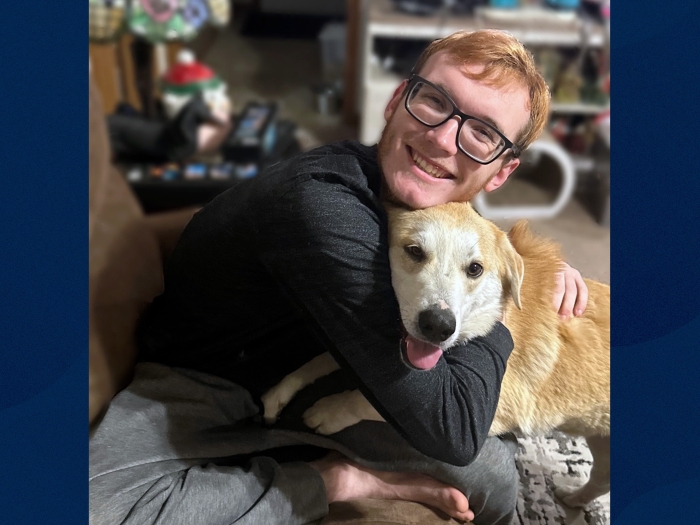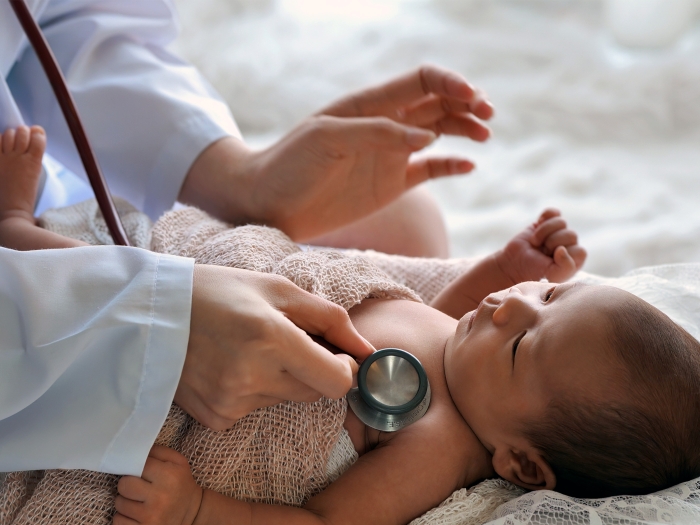A team of audiologists detail the diverse range of services within their scope.
1:34 PM
Author |

Are you dealing with a communication disorder, hearing loss or problems with dizziness and balance? If so, there's actually a specialist that can help you with that.
Michigan Medicine has a diverse team of professionals within their department of otolaryngology that treats patients with speech, hearing and balance conditions. And audiologists are a part of this group.
What is an audiologist?
"Audiologists are health care professionals trained to assess and treat hearing and balance disorders," says Devin McCaslin, Ph.D., director of audiology at Michigan Medicine. "Our audiology team focuses on providing patients with individualized care in order to deliver the best possible experience during their appointments and outcomes following treatment."
And the team sees individuals of all ages. Pediatric patients can be seen at C.S. Mott Children's Hospital and Michigan Medicine's satellite clinics in Livonia and Brighton. Adult patients can be seen at the organization's Taubman clinic, while hearing aid services are offered at East Ann Arbor, West Ann Arbor, Livonia and Brighton.
"For our patients with severe hearing loss, or for those who no longer benefit from traditional amplification, we offer cochlear implant services at our Briarwood location," says McCaslin.
Vestibular testing and treatment
The vestibular system can be described as the sensory system that provides us with a sense of balance, and much of the work in this realm involves the inner ear. McCaslin notes that the vestibular team consists of audiologists and vestibular physical therapists that spans to pediatric patients.
"Our work is focused on a team-centered approach," he says. "We always aim to provide the best possible care for our patients. This is made possible through our collaborations with physicians in otolaryngology, neurology, oncology and family medicine. Together, we are able to deliver unmatched coordinated care for hearing and balance disorders."
Treating pediatric audiology issues
McCaslin says that the pediatric audiology team has several different clinics that treat conditions that include:
- Osteogenesis;
- Imperfect;
- Microtia;
- Craniofacial abnormalities; and
- Cleft palate.
In addition, patients with tinnitus can find management options from a team of otologists, audiologists and social workers.
McCaslin adds that the division is also closely connected with the University of Michigan School of Music, Theatre & Dance: "We regularly provide hearing health care for patients that are interested in hearing conservation and preservation. This includes hearing screenings and informational presentations."
Intraoperative monitoring in audiology
According to McCaslin, a distinctive service within the audiology department at Michigan Medicine is its intraoperative monitoring team. Comprised of five audiologists and an intraoperative monitoring fellow, this group primarily performs cranial nerve monitoring for otology, head and neck, and several other neurosurgeries.
Our audiology team focuses on providing patients with individualized care in order to provide them with the best possible experience during their appointments and outcomes following treatment.
However, while intraoperative monitoring is within an audiologist's scope of practice, many audiologists do not receive formal training.
"Intraoperative monitoring audiologists monitor nerves like the auditory, or hearing, nerve in at-risk procedures in an effort to preserve hearing in the operative ear in collaboration with the surgical team," says Lindsay Koehler, Au.D., a clinical audiologist with a specialization in intraoperative monitoring. "This unique specialty provides our audiologists with the opportunity to follow patients throughout their care at Michigan Medicine, from clinic to the operating room."
COVID-19 and hearing health care
Unfortunately, with COVID-19 came several communication difficulties for individuals with hearing loss.
"Hearing loss has a significant impact on quality of life in our patients, and this has become more pronounced since the pandemic began," explains Rachel Fryatt, Au.D., a clinical audiologist at Michigan Medicine. "Audiologists are able to provide hearing health care to help those individuals who are missing visual cues, and can now participate in conversations with the help of hearing devices."
Fryatt notes that face masks have taken away visual cues that many individuals with hearing loss rely upon, and social distancing, as well as other physical barriers, have made it harder for some to hear their communication partners.
However, the team has been able to provide services despite these barriers.
"Our clinic has been following strict protocols related to patient care to ensure that everyone remains safe and healthy," says Teresa Zwolan, Ph.D., director of the Cochlear Implant Program at Michigan Medicine. "Having to wear a mask has been particularly challenging for the patients we work with, but we've been using clear masks that enable patients to see our faces so that they can read our lips. And this has helped with communication."
Hearing services for the community
According to Caitlin Donovan, Au.D., a clinical audiologist, she and her team provide hearing testing and device fitting to underserved populations through the Hope Clinic.
Remarkably, over 230 outside individuals have donated hearing aids to the clinic so far, and over 850 hearing aids have been donated to individuals in need. While the clinic's services were temporarily suspended at the beginning of the pandemic, the team was excited to return to work when things began to improve.
"It truly is a rewarding experience to provide patients with better hearing and help improve their quality of life," says Donovan, who regularly volunteers at the Hope Clinic. "As a part of our services, we also refurbish donated hearing aids to help bridge the gap of hearing health care accessibility in these populations."
If you're interested in seeking more information about the services described, please call (734) 936-8051.

Explore a variety of health care news & stories by visiting the Health Lab home page for more articles.

Department of Communication at Michigan Medicine
Want top health & research news weekly? Sign up for Health Lab’s newsletters today!





